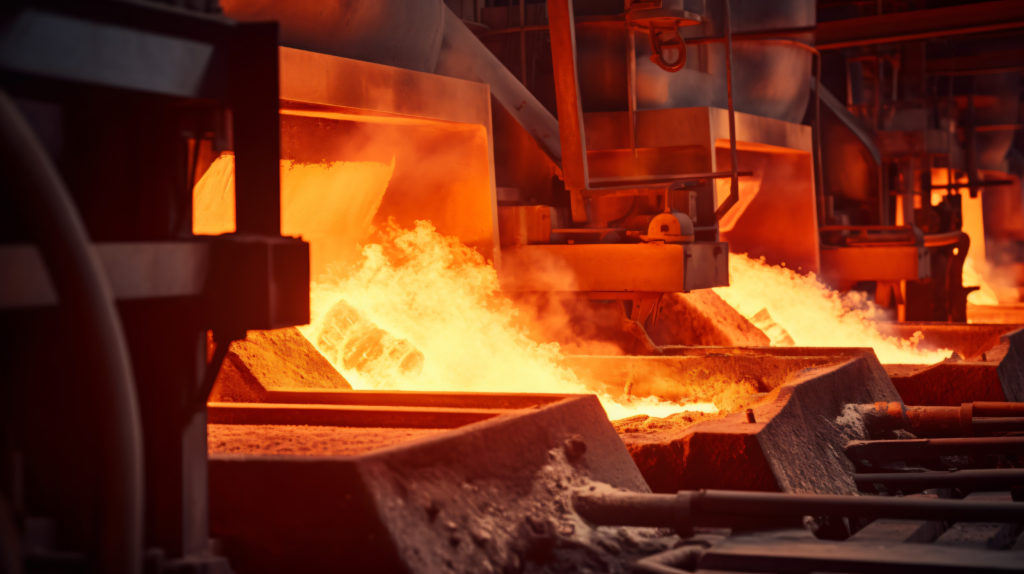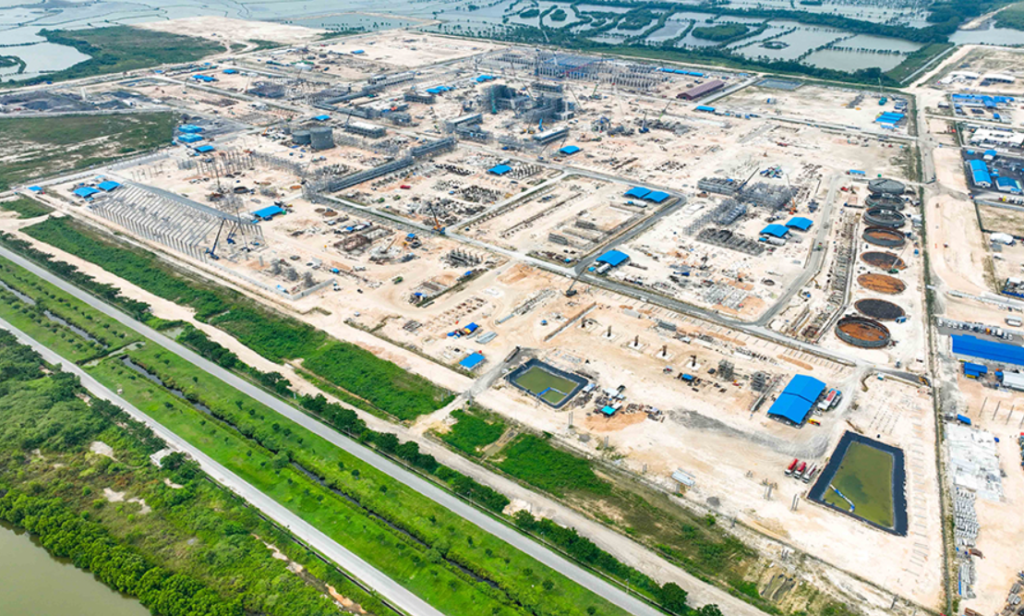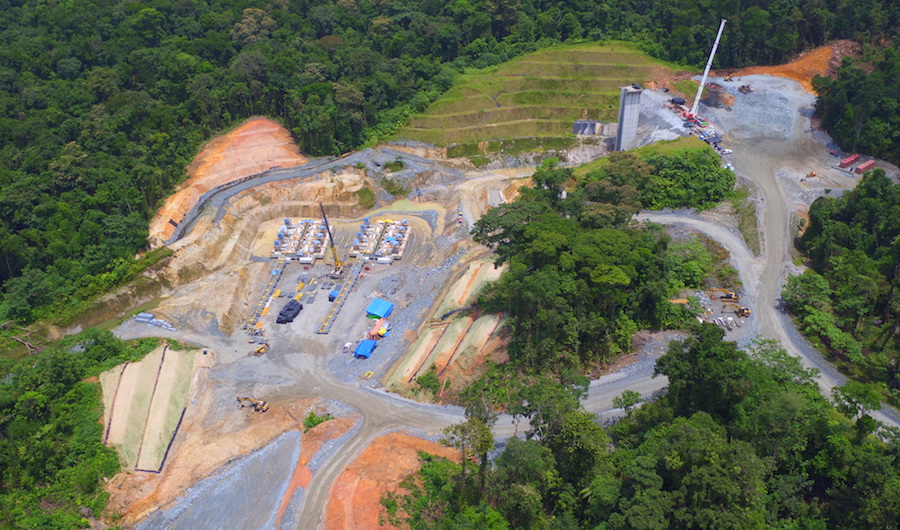China copper smelters move closer to possible 10% production cut
Bloomberg News | March 28, 2024 |

Stock image.
Chinese smelters, which produce over half the world’s supply of refined copper, moved a step closer to implementing a joint output cut after tightening ore supplies drove processing fees to near zero.

Thirteen major smelters proposed a reduction of 5% to 10% in planned output this year, according to people with knowledge of the matter, who asked not to be identified because the discussions are private. The proposal was made at the quarterly meeting of the Copper Smelters Purchasing Team, known as CSPT, in Shanghai on Thursday, the people said.
The proposal follows talks between smelters and the government earlier this month about possible production cuts and capacity controls, news of which helped send copper prices to an 11-month high on the London Metal Exchange. Smelters will now discuss the exact scope of individual cuts, said one of the people. Representatives from Jiangxi Copper Co. and Tongling Nonferrous Metals Group declined to comment.
Chinese smelters are at a critical juncture after so-called treatment and refining charges — the amount they are paid to convert ore concentrate into metal — collapsed to near zero levels on the spot market. The plunge has been driven by a slew of supply setbacks at global mines, coupled with relentless expansion in Chinese capacity that’s boosted competition.
BHP Group Ltd. sold cargoes of copper concentrates from its giant mine Escondida at treatment charges of as low as $3 a metric ton and refining charges of 0.3 cents a pound to at least one Chinese smelter in its latest offer, according to people familiar with the deals. That’s the lowest in at least a decade, one of the people said.
Doubts linger
Uncertainty surrounds whether the cuts will be fully implemented, said two of the people. Term fees for concentrate are still profitable, while provincial governments need to meet the country’s ambitious growth goals and are not keen on shrinking the contribution from local industries.
In a sign of the relentless growth of Chinese refined copper output, top smelter Jiangxi Copper said in an earnings release Wednesday that its production will rise 11% to 2.32 million tons this year, following a 14% increase in 2023. The target could be adjusted based on the market, while it flagged possible output cuts at some of its peers who rely more on the spot market.
At Thursday’s meeting, the smelters also left out the usual setting of so-called floor prices for treatment charges for the coming quarter, the people said, as the prices used to guide them in separate negotiations for concentrate supplies from miners are increasingly irrelevant after the plunge in spot fees.
Jiangxi Copper expects copper prices to rise in the second half once the Federal Reserve cuts interest rates. The market should remain in a tight balance this year, it said, as supply shrinks and consumption increases steadily, led by renewable energy demand.
Copper was up 0.3% at $8,873,50 a ton on the LME as of 3:28 p.m. local time. Prices hit $9,164.50 on March 18, the highest level since April last year.
First Quantum execs discuss investment, disputed copper with Chinese officialsBloomberg News | March 28, 2024 |

Stock image.
Chinese smelters, which produce over half the world’s supply of refined copper, moved a step closer to implementing a joint output cut after tightening ore supplies drove processing fees to near zero.

Thirteen major smelters proposed a reduction of 5% to 10% in planned output this year, according to people with knowledge of the matter, who asked not to be identified because the discussions are private. The proposal was made at the quarterly meeting of the Copper Smelters Purchasing Team, known as CSPT, in Shanghai on Thursday, the people said.
The proposal follows talks between smelters and the government earlier this month about possible production cuts and capacity controls, news of which helped send copper prices to an 11-month high on the London Metal Exchange. Smelters will now discuss the exact scope of individual cuts, said one of the people. Representatives from Jiangxi Copper Co. and Tongling Nonferrous Metals Group declined to comment.
Chinese smelters are at a critical juncture after so-called treatment and refining charges — the amount they are paid to convert ore concentrate into metal — collapsed to near zero levels on the spot market. The plunge has been driven by a slew of supply setbacks at global mines, coupled with relentless expansion in Chinese capacity that’s boosted competition.
BHP Group Ltd. sold cargoes of copper concentrates from its giant mine Escondida at treatment charges of as low as $3 a metric ton and refining charges of 0.3 cents a pound to at least one Chinese smelter in its latest offer, according to people familiar with the deals. That’s the lowest in at least a decade, one of the people said.
Doubts linger
Uncertainty surrounds whether the cuts will be fully implemented, said two of the people. Term fees for concentrate are still profitable, while provincial governments need to meet the country’s ambitious growth goals and are not keen on shrinking the contribution from local industries.
In a sign of the relentless growth of Chinese refined copper output, top smelter Jiangxi Copper said in an earnings release Wednesday that its production will rise 11% to 2.32 million tons this year, following a 14% increase in 2023. The target could be adjusted based on the market, while it flagged possible output cuts at some of its peers who rely more on the spot market.
At Thursday’s meeting, the smelters also left out the usual setting of so-called floor prices for treatment charges for the coming quarter, the people said, as the prices used to guide them in separate negotiations for concentrate supplies from miners are increasingly irrelevant after the plunge in spot fees.
Jiangxi Copper expects copper prices to rise in the second half once the Federal Reserve cuts interest rates. The market should remain in a tight balance this year, it said, as supply shrinks and consumption increases steadily, led by renewable energy demand.
Copper was up 0.3% at $8,873,50 a ton on the LME as of 3:28 p.m. local time. Prices hit $9,164.50 on March 18, the highest level since April last year.
Freeport warns copper export ban could cost Indonesia $2bn in lost revenue
Reuters | March 28, 2024 |

Credit: Freeport Indonesia
Copper miner Freeport Indonesia has warned the Indonesian government that banning exports of copper concentrate in June could lead to a loss of $2 billion in revenues for Jakarta, a company official said on Thursday.

Indonesia’s export ban takes effect from June in an effort to force miners to invest in domestic smelting facilities, thus adding value to their products, boosting earnings from exports.
Freeport Indonesia, controlled by mining giant Freeport McMoran, though the Indonesian government is a majority shareholder, has called for the ban to be relaxed as its Gresik smelter would not be operating at full capacity by June.
“If we can’t export, state revenues will drop by around $2 billion, based on current prices,” media quoted chief executive Tony Wenas as saying in remarks confirmed by a company spokesperson.
The comments followed a meeting with President Joko Widodo, at which he was accompanied by Freeport McMoran’s chairman Richard Adkerson and incoming chief executive Kathleen L. Quirk.
Wenas reiterated that construction of the Gresik smelter would be complete by May and start operating the following month, reaching full capacity later in 2024.
A spokesperson for Indonesia’s mining ministry declined to comment.
At a separate event on Thursday, Widodo told reporters the government targets completion of all negotiations with Freeport by June at the latest.
“We have to finalize the regulation first and then we can finalize the negotiation,” he said, referring to a rule on extension of mining permits.
Wenas has previously said Freeport Indonesia would have to cut ore production by 40% this year if the government did not delay the ban.
On Wednesday, Indonesian copper miner Amman Mineral Internasional said it was also negotiating with the government to relax the ban since its smelter would not be ready by May, arguing that the government earns tax revenues from Amman as well as Freeport.
Freeport also raised the matter of extending its mining permit during the meeting, Wenas said.
Widodo and Adkerson met last November to discuss a 10% increase in Indonesia’s ownership of Freeport Indonesia and a 20-year extension of its mining permit beyond the current expiry date of 2041.
(By Bernadette Christina Munthe, Stefanno Sulaiman, Fransiska Nangoy and Gayatri Suroyo; Editing by Clarence Fernandez)
Reuters | March 28, 2024 |

Credit: Freeport Indonesia
Copper miner Freeport Indonesia has warned the Indonesian government that banning exports of copper concentrate in June could lead to a loss of $2 billion in revenues for Jakarta, a company official said on Thursday.

Indonesia’s export ban takes effect from June in an effort to force miners to invest in domestic smelting facilities, thus adding value to their products, boosting earnings from exports.
Freeport Indonesia, controlled by mining giant Freeport McMoran, though the Indonesian government is a majority shareholder, has called for the ban to be relaxed as its Gresik smelter would not be operating at full capacity by June.
“If we can’t export, state revenues will drop by around $2 billion, based on current prices,” media quoted chief executive Tony Wenas as saying in remarks confirmed by a company spokesperson.
The comments followed a meeting with President Joko Widodo, at which he was accompanied by Freeport McMoran’s chairman Richard Adkerson and incoming chief executive Kathleen L. Quirk.
Wenas reiterated that construction of the Gresik smelter would be complete by May and start operating the following month, reaching full capacity later in 2024.
A spokesperson for Indonesia’s mining ministry declined to comment.
At a separate event on Thursday, Widodo told reporters the government targets completion of all negotiations with Freeport by June at the latest.
“We have to finalize the regulation first and then we can finalize the negotiation,” he said, referring to a rule on extension of mining permits.
Wenas has previously said Freeport Indonesia would have to cut ore production by 40% this year if the government did not delay the ban.
On Wednesday, Indonesian copper miner Amman Mineral Internasional said it was also negotiating with the government to relax the ban since its smelter would not be ready by May, arguing that the government earns tax revenues from Amman as well as Freeport.
Freeport also raised the matter of extending its mining permit during the meeting, Wenas said.
Widodo and Adkerson met last November to discuss a 10% increase in Indonesia’s ownership of Freeport Indonesia and a 20-year extension of its mining permit beyond the current expiry date of 2041.
(By Bernadette Christina Munthe, Stefanno Sulaiman, Fransiska Nangoy and Gayatri Suroyo; Editing by Clarence Fernandez)
Reuters | March 29, 2024 |

Cobre Panama mine. (Image: First Quantum Minerals.)
Executives from Canadian miner First Quantum Minerals met with Chinese government officials last week to discuss funding and business options involving top investor Jiangxi Copper Co, three sources with knowledge of the matter said.

The talks in Jiangxi province included topics such as the potential for state-run Jiangxi Copper, China’s leading producer, to gain influence on First Quantum’s board decisions, two of the sources said. Also discussed was the future of First Quantum’s Zambian assets and the prospect of Jiangxi buying its disputed copper concentrates inventory from Panama, they said.
Shares of First Quantum were up 5% in late morning trading on the Toronto Stock Exchange.
Since November last year, Jiangxi has invested about $745 million in First Quantum through debt, equity and a prepayment copper deal. Still, despite being one of the biggest shareholders, Jiangxi does not have any say in board decisions.
Under a standstill agreement, Jiangxi is prevented from buying more than a 20% equity stake in First Quantum. It currently holds 18.4%.
It was not clear whether there would be further new investments after the meeting, one of the sources said.
First Quantum declined to comment, while Jiangxi Copper did not respond to queries from Reuters by email or phone.
Relations between Jiangxi and First Quantum have been volatile since 2019, when the Chinese miner invested $1 billion, fuelling speculation it was preparing for a hostile takeover.
However, Jiangxi was a firm supporter during recent turbulence for the Canadian company, buying bonds and shares over the past four months.
First Quantum inks $500 million copper deal with Jiangxi amid Panama mine struggles
“By far they (Jiangxi) have been the most useful partner for the company,” said an official aware of First Quantum’s operations.
First Quantum has shed some C$8 billion or $5.89 billion in market capital since Panama’s government ordered the shutdown of the Cobre Panama mine late last year following sustained local protests.
The sudden closure order of Cobre Panama, accounting for 40% of First Quantum’s revenue, dealt a blow to investor confidence and led to a cut in its debt rating.
First Quantum announced measures in February that included offering $1 billion worth of common shares and a copper pre-payment agreement with Jiangxi worth $500 million. Jiangxi also purchased $212 million of First Quantum shares earlier in March.
First Quantum has been negotiating with the Panama government for a resolution of the dispute. One of the discussions has centred on selling copper concentrate to pay for care and maintenance of the disputed mine.
Jiangxi Copper accounted for one-fifth of China’s total production last year and is one of the world’s top buyers of mined copper raw material and, like other copper smelters, it faces an acute shortage of feedstock.
Reuters reported earlier Jiangxi Copper was in talks to acquire a stake in First Quantum’s Kansanshi mine in Zambia.
($1 = 1.3562 Canadian dollars)
(By Julian Luk; Divya Rajagopal; Editing by Veronica Brown and Bernadette Baum)
No comments:
Post a Comment